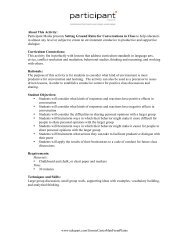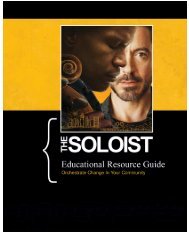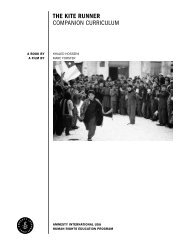teach - TakePart
teach - TakePart
teach - TakePart
Create successful ePaper yourself
Turn your PDF publications into a flip-book with our unique Google optimized e-Paper software.
TEACHVIEWING GUIDELINES FOR TEACHTEACH is a point of departure for a larger conversation about one of our most preciouscommunity resources: our <strong>teach</strong>ers. The film is meant to be discussed, not just watched.In this vein we provide the following guidelines for a facilitated viewing of the film TEACH.While many of the procedures that follow lend themselves seamlessly to a more formaleducational context, we encourage hosts to pick and choose the activities and discussiontopics that are relevant, even for small groups in a relaxed setting. These guidelinescan be used in many ways with a variety of audiences: with friends and neighbors at anin-home viewing party, or as part of a course or workshop with pre-service <strong>teach</strong>ers,in-service <strong>teach</strong>ers, parents, students, and others. The pre-viewing activities are meantto prepare viewers to look for specific topics and themes as they watch the film. Postviewingdiscussions can help transform participants from passive viewers into activethinkers, as the discussions provide a multitude of ways for viewers to engage criticallywith the show’s material. If your event is a more formal one, try to watch the film yourselfand create a list of the main points for post-screening discussion. This will help you be anactive, engaged, and prepared facilitator.Before Viewing1. Before starting the film, provide a brief introduction to the film and the issues itraises. Refer to the sections “About This Film” and “Key Statistics” in this guide fora general description. Then, communicate some of the central themes that recurthroughout the documentary, including:• Perseverance as a key predictor of success• The instructive value of being challenged• Innovation, technology, and learning• The importance of constructive supervision, coaching, and mentoring in thelearning process• The importance of reflection and assessment in the learning process• Authentic human connections at the heart of <strong>teach</strong>ing and learning• Flexibility, change, and resilience as necessary strategies for success2. On a flip chart or white board, write the following terms:TEACHEDUCATEINSPIRELEARNPAGE 63. In a large group discussion, elicit definitions and associations for each word fromthe group, creating web frameworks for each as you chart their responses on theboard. To guide the discussion, ask participants to consider how each term issimilar, and how they are different.









